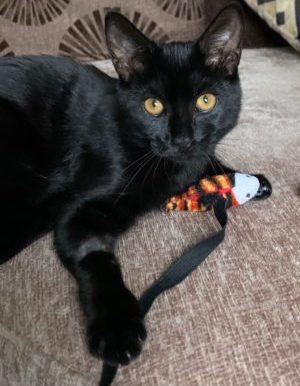
In 2017 we invested in equipment at our Torquay surgery to be able to offer keyhole surgery for the benefit of our patients, one of the first practices in Devon to do so. Keyhole surgery is now considered the highest standard in human medicine due to faster recovery times and less pain, and we see the same in our pet patients.
We routinely utilise keyhole surgery for neutering of female dogs, but we can also use it for spaying female cats too. This is what Veterinary Nurse Claire chose for her kitten, Tennessee, when she came in to be neutered recently.
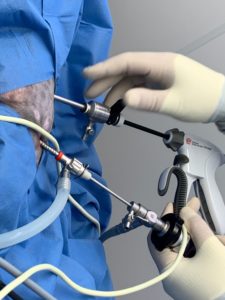
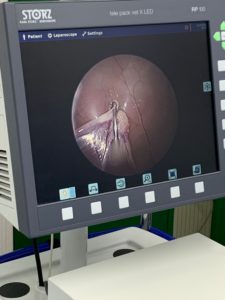
A normal spay involves removal of the womb and ovaries via an incision through the skin and muscle of the tummy. With key-hole surgery the ovaries are removed via 2 tiny incisions, less than 1cm long. The main advantages to the patient are:
- It is less painful than a traditional spay. Although we always use pain relief for all our patients, there is less pain associated with two tiny incisions than one large one and this can only be a good thing!
- It provides the surgeon with a much better view. Even though the holes are very small, the camera equipment used allows the surgeon to see more clearly within the abdomen and get up close to things to see them in great detail. This reduces potential complications.
- Less bleeding, swelling and bruising. The keyhole spay makes full use of our ‘harmonic scalpel’ which seals blood vessels and tissue before they have a chance to bleed. This creates much less trauma than a traditional spay, with little or no bleeding.
- Faster recovery. As the incisions are so much smaller, your pet is more likely to be able to get back to normal activity much sooner than with a traditional approach.
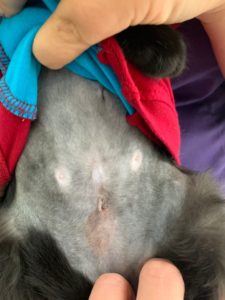
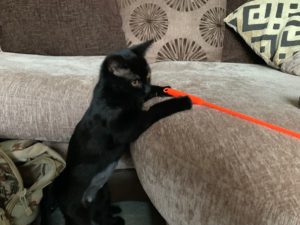
Claire reported that Tennessee was back to mischief the same evening of the operation!
A recent study has shown that a keyhole spay procedure has significant benefits and a lower post-operative complication rate, compared with traditional spay surgery in dogs.* You can also find further information about the benefits of keyhole spay here.
Keyhole surgery can also be used for castrating cryptorchid dog and cats i.e. when one or both of the testicles are retained within the tummy.
The other area where keyhole surgery is of huge benefit is in ill dogs or cats who have disease within their tummy. Keyhole surgery allows the surgeon to get an excellent view of the tummy organs and to take biopsies, e.g. of the liver, without your pet undergoing major surgery.
* Charlesworth TM and Sanchez FT (2019). A comparison of the rates of postoperative complications between dogs undergoing laparoscopic and open ovariectomy, JSAP 60(4):218-222.
